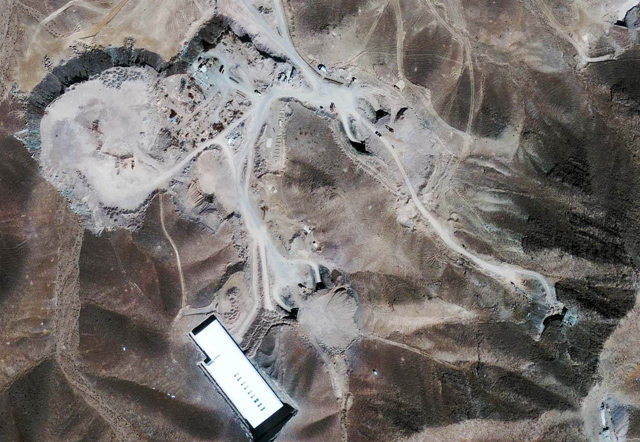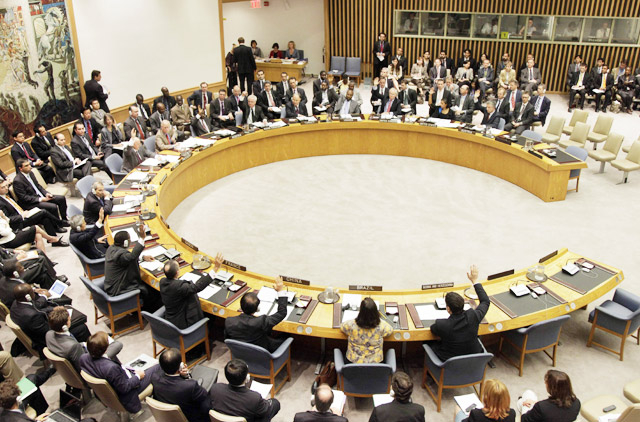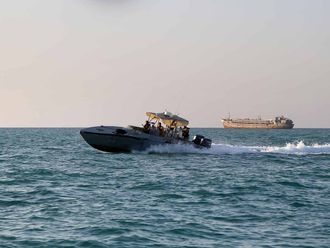The United States and its allies won approval for the toughest UN sanctions till date against Iran for refusing to negotiate on its suspect nuclear programme.
Gulf News explains what the new measures mean and what happens next:
What are the new sanctions on Iran imposed by the UN Security Council?
The 15-nation UN Security Council passed a resolution on Wednesday that was the product of five months of talks between the United States, Britain, France, Germany, China and Russia. With 12 votes in favour, it received the least support of the four Iran sanctions resolutions adopted since 2006. The sanctions resolution:
- Calls for measures against new Iranian banks abroad if a connection to the nuclear or missile programmes is suspected
- Vigilance over transactions with any Iranian bank, including the central bank
- Expands a UN arms embargo against Tehran
- Blacklists three firms controlled by Islamic Republic of Iran Shipping Lines and 15 belonging to the Islamic Revolutionary Guard Corps
- Calls for setting up a cargo inspection regime similar to one in place for North Korea
Will the new sanctions have any impact on Iran?
According to international observers, the new sanctions are unlikely to affect Iran in any way. Three rounds of UN sanctions have already been imposed on Iran, which have had hardly any impact on Iran’s policies, experts believe. According to BBC Online, there are two reasons why sanctions have failed.
The first is that they are not targeted against Iran's vital economic interests, and Iran has developed systems of evasion in any case.
The second is that the Iranian government is more than willing to absorb the limited economic effect they have in favour of the greater political benefit it gets from continuing with its nuclear activities. News agencies reported that UN diplomats are already talking about yet another round of sanctions next year.
The BBC says that such an indication suggests many more months of waiting to see what Iran does, more monitoring and reports from the International Atomic Energy Agency (IAEA) and more negotiations over yet more sanctions.
It also implies that the option of an attack on Iranian nuclear plants is not an active one, though diplomats do accept that at some stage it will not be realistic to hope for any diplomatic solution.
What has been the reaction from Iran?
Iran has generally dismissed all UN resolutions against it, and the new one is no different. Iranian President Mahmoud Ahmadinejad, on an official visit in Tajikistan, dismissed the new resolution.
"From right and from left, they adopt sanctions, but for us they are annoying flies, like a used tissue," he said.
Iran's top nuclear negotiator, Saeed Jalili, warned that "choosing the option of confrontation will bring Iran's resolute response," according to Iran's official news agency.
And Iran's UN Ambassador Mohammad Khazaee accused the United States, Britain and their allies of abusing the Security Council to attack Iran.
"No amount of pressure and mischief will be able to break our nation's determination to pursue and defend its legal and inalienable rights," Khazaee said. "Iran is one of the most powerful and stable countries in the region and never bowed – and will never bow – to the hostile actions and pressures by these few powers and will continue to defend its rights."
Iran’s state TV says the country’s parliament plans to revise relations with the UN nuclear watchdog agency in response to the latest round of sanctions. Parliament National Security and Foreign Policy Committee head Alaeddin Boroujerdi said Thursday lawmakers on Sunday will “begin a revision of Iran’s relations” with the International Atomic Energy Agency.
He did not specify what options were to be discussed, but a revision could result in restricting IAEA inspectors' access to Iran's nuclear facilities.
Who voted against the sanctions and why?
The new UN resolution passed despite “no” votes from angry Turkey and Brazil, which argued that sanctions were the wrong approach to take with Tehran, and an abstention from Lebanon. The fact that all five permanent veto-wielding council members - including Russia and China – voted for the resolution sent Iran a strong message. At the same time, analysts expressed concern about the dissenting votes in the council.
Turkey and Brazil, angry about the West's dismissal of a nuclear fuel swap deal with Iran that they say makes new sanctions unnecessary, voted against them. "It's regrettable that the council is now divided on the issue," said Mark Fitzpatrick of the International Institute for Strategic Studies in London.
“Tehran's leaders will take solace in that but will also be sorely disappointed that their diplomatic gambit with Brazil and Turkey wasn't able to avoid a new round of sanctions." Experts say it is vital for Obama and his allies to reach out to Turkey and Brazil to avoid diplomatic fallout.
What do the new sanctions mean for the US?
Analysts say the new measures are a significant victory for the Obama administration. “It shows that the US can hold the P5-plus-one group together,” David Albright, head of the Washington-based Institute for Science and International Security (ISIS), told Reuters, referring to the United States, Britain, France, Germany, China and Russia.
“It’s not a huge success but it's a success.” Originally US President Barack Obama and his European allies had wanted tougher measures, including targeting Tehran’s oil and gas industries and a blacklisting of Iran's central bank. Moscow and Beijing refused to support that.
What happens next with the implementation of the resolutions?
UN Security Council diplomats say that although it is diluted, the new resolution adopted is much tougher than Washington and its three European allies had expected when they began negotiating with the Russians and Chinese in January.
But critics point out that many of the measures are voluntary. They also say none of the measures in the three previous sanctions resolutions passed since 2006, nor US and Israeli hints of possible military action, were enough to force Iran to abandon its enrichment programme.
The effectiveness of the sanctions, analysts say, will ultimately depend on their implementation. In the past, Russia and China, which have close trade ties with Tehran, have been lax about applying the sanctions, analysts and diplomats say. China’s UN Ambassador Li Baodong, said Beijing was determined to see that the new sanctions are implemented fully.
Are there any more sanctions planned?
Western diplomats and analysts argue that with the new resolution, the European Union, United States and their allies around the world now have the legal basis to impose their own measures that will be much tougher than anything the Security Council has agreed on.
“The draconian measures will come from the EU,” Albright said. Albright's assessment was confirmed by EU diplomats, who said major European states plan to impose further sanctions on Iran and could agree them very soon. US Defence Secretary Robert Gates said Iran's oil and gas export capability might be among the targets.
With inputs from Reuters, AP & BBC Online














